使用remix在线编辑器写简单代币
编辑器地址:remix.ethereum.org(部分地区需要翻墙)
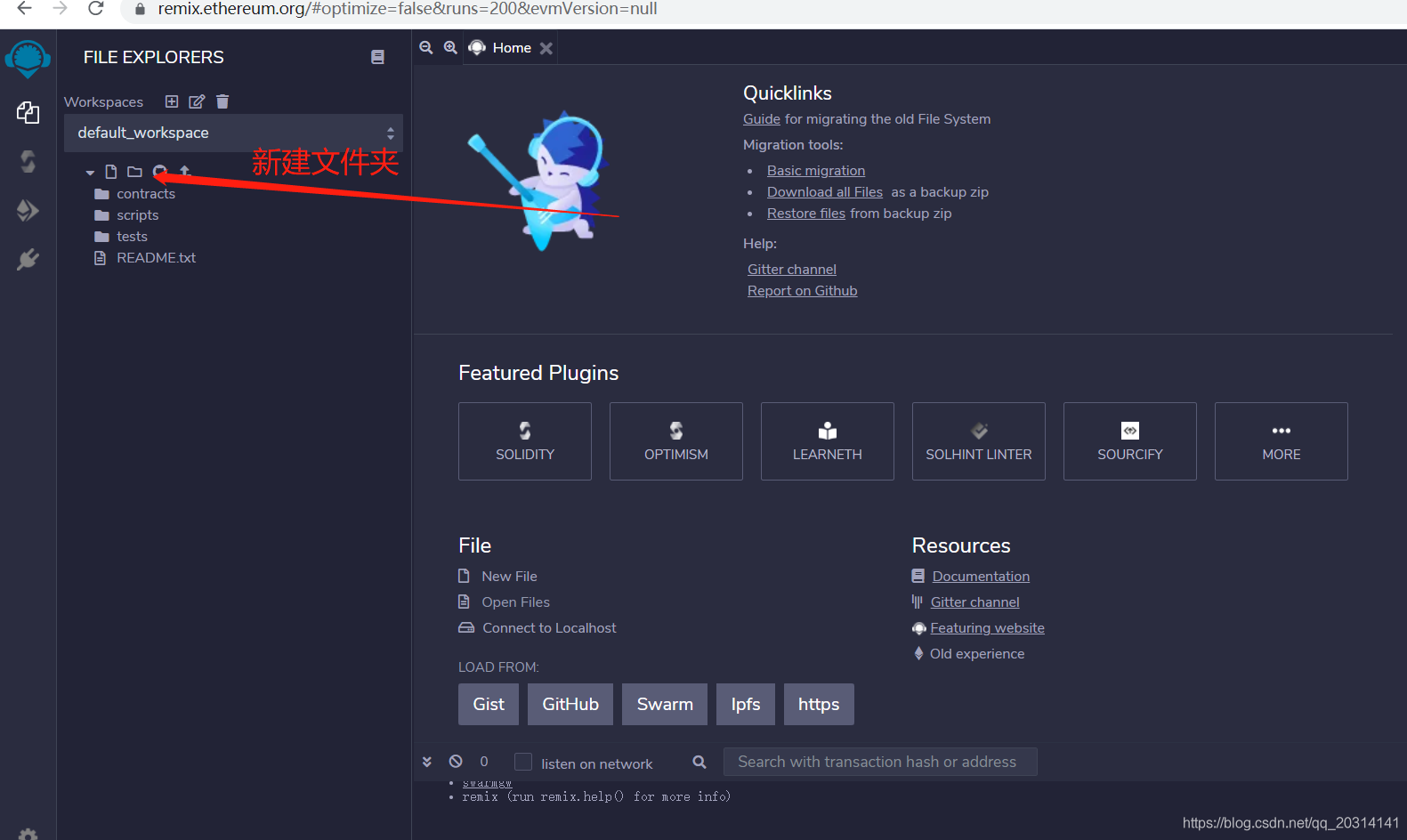
上面是这个在线编辑器,我们先新建个文件夹

再建一个Token.sol文件。
Token.sol文件内容
// SPDX-License-Identifier: MIT
pragma solidity ^0.6.2;
import "./ERC20.sol";
contract Token is ERC20{
string private _name; //代币名字
string private _symbol; //代币符号
/*
* @dev 返回代币的名字
*/
function name() public view virtual returns (string memory) {
return _name;
}
/**
* @dev 返回代币的符号
*/
function symbol() public view virtual returns (string memory) {
return _symbol;
}
/**
* 返回代币精度
*/
function decimals() public pure virtual returns (uint8) {
return 18;
}
constructor() public{
_name='Token';
_symbol='Tk';
_mint(msg.sender, 10000000000000 * (10 ** 18)); //铸币给连接此合约的账号于10000000000000个币;
}
//交易函数
function _transfer(address recipient,uint256 amount) public returns(bool){
return super.transfer(recipient, amount); //发送代币
}
function _transferFrom(address sender,address recipient,uint256 amount) public returns(bool){
return super.transferFrom(sender,recipient,amount); //发送代币
}
}
在这代码中我们实现了一个简单代币功能,ERC20.sol是一个以太坊的库。里面包括了一系列的针对代币的方法。ERC20.sol的代码我会在后面贴出来。这里的_mint是ERC20的一个铸币方法。参数是_mint(address account, uint256 amount)指给左边地址多少个amount的币。
接着我们配置metamask的测试网络配置如下:
NetWork Name: BSC Testnet RPC URL:https://data-seed-prebsc-1-s3.binance.org:8545/ ID:97 符号:BNB URL:https://testnet.bscscan.com/
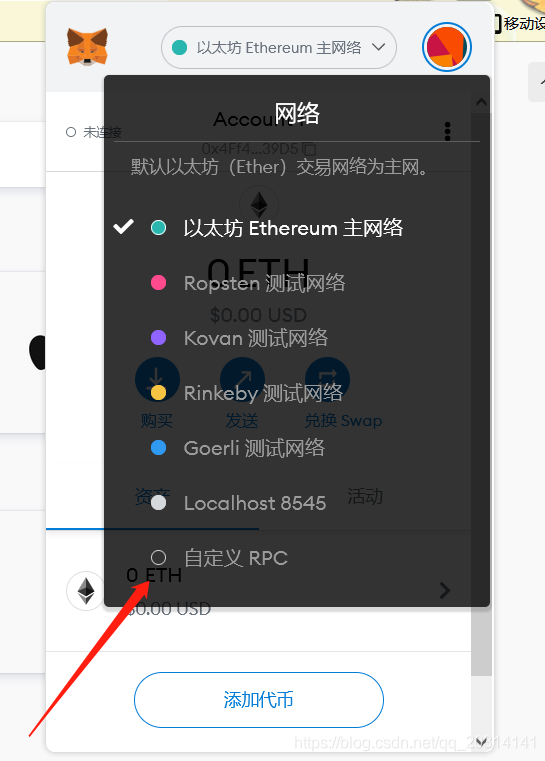
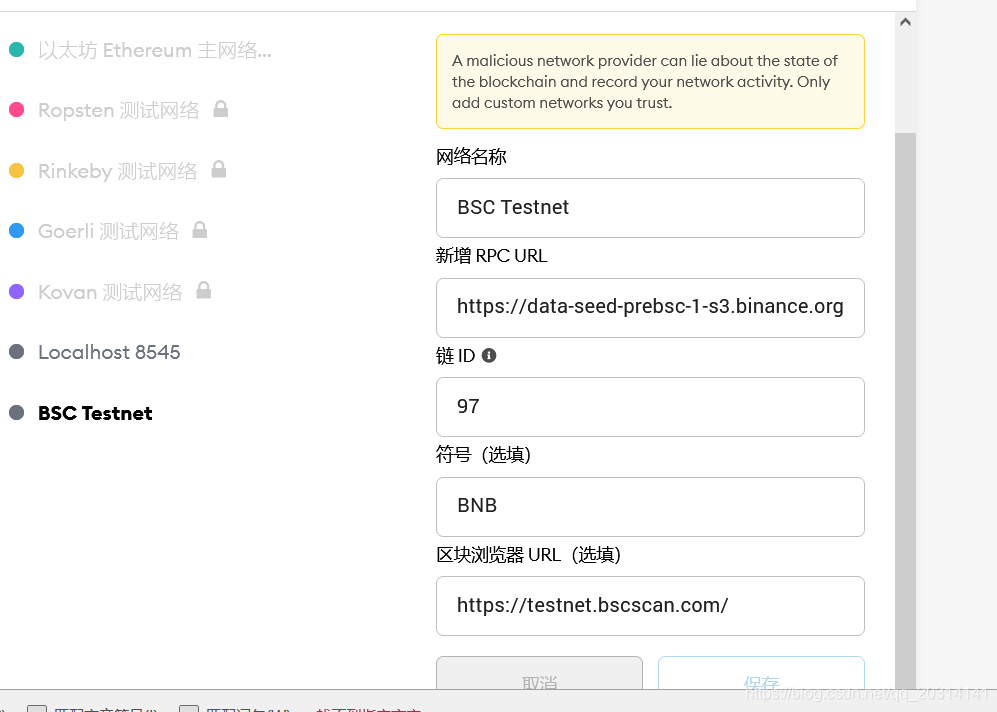
再去Binance Smart Chain: Faucet里面输入的地址领取测试币
之后再部署这个代币到bsc测试链里面
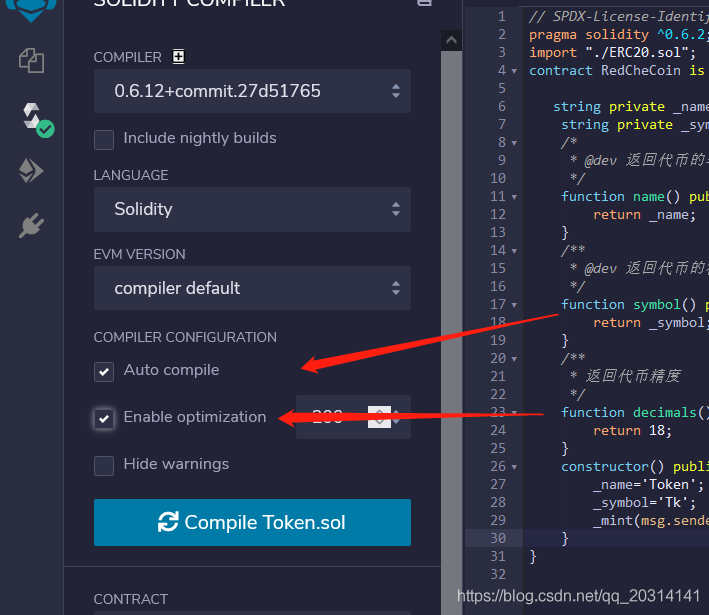
根据从上到下箭头依次选择即可
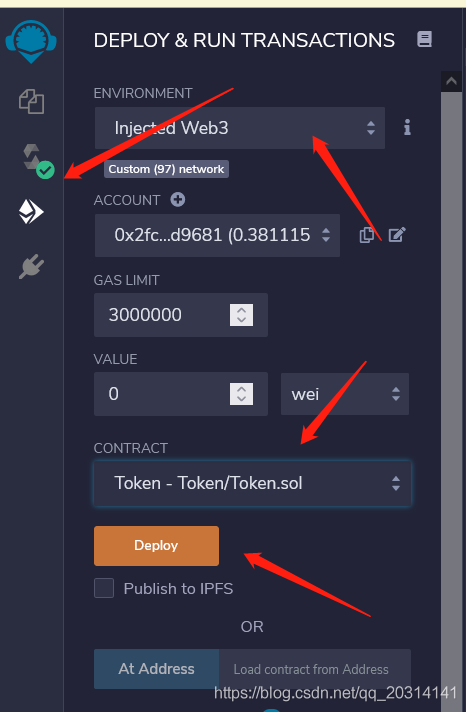
这是部署之后的
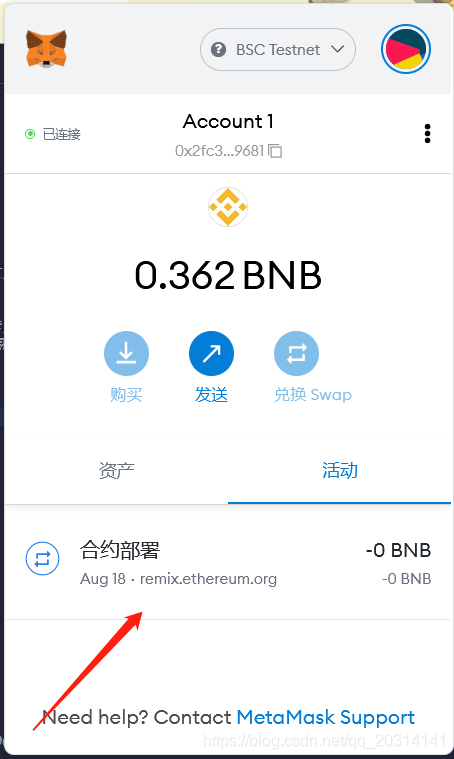
点击浏览器打开
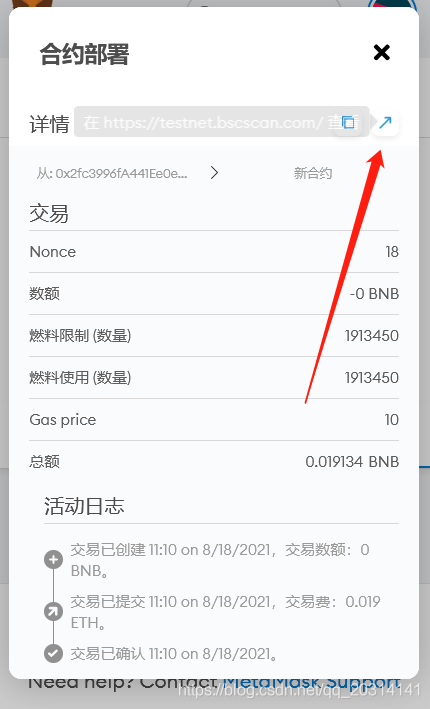
这个就是你的合约地址了,之后添加该代币
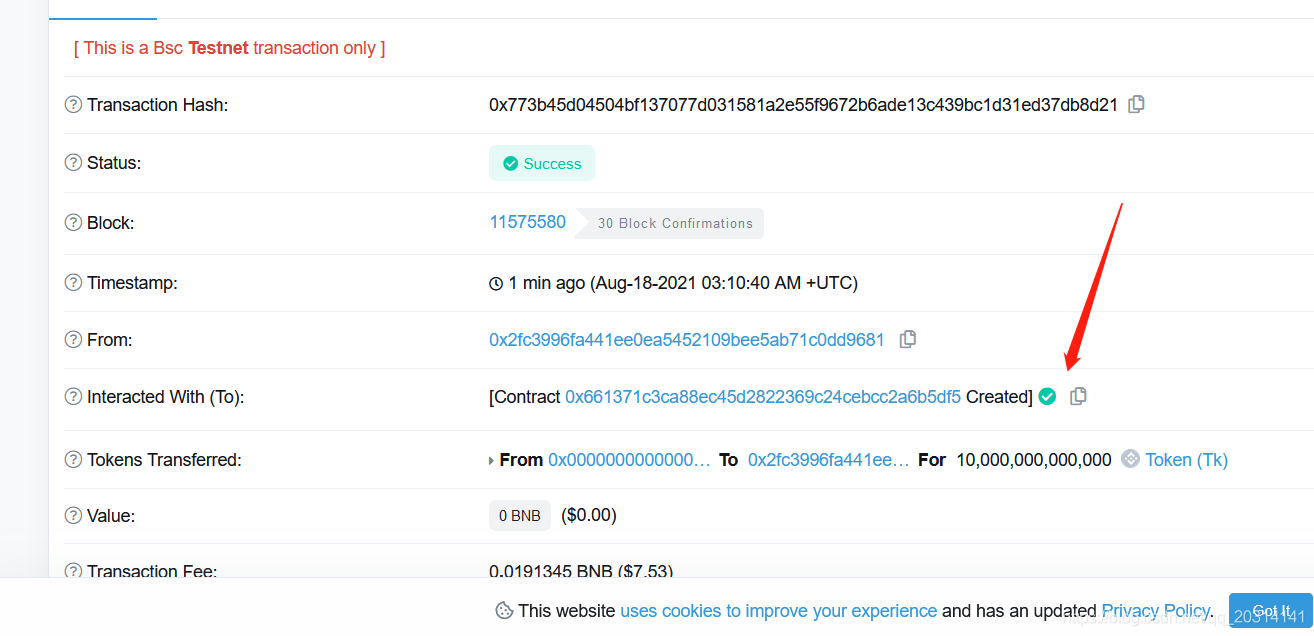
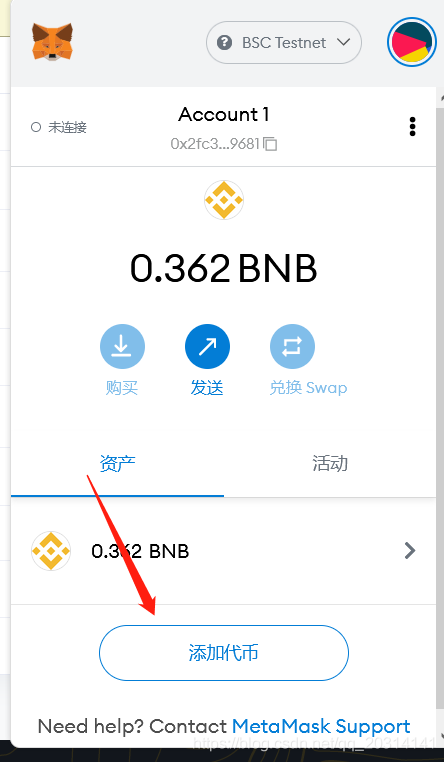
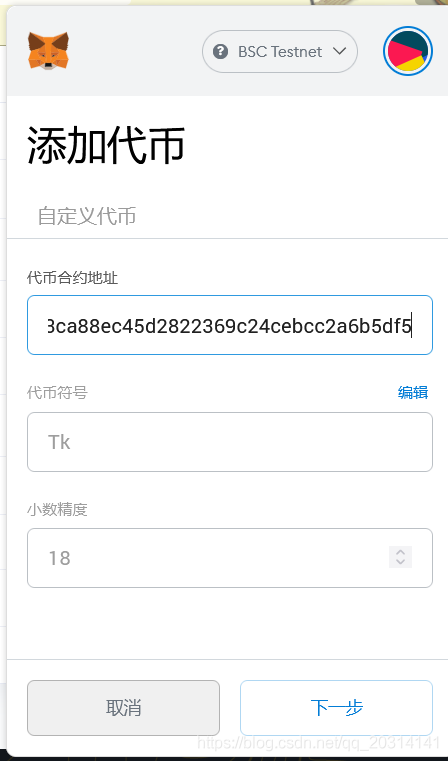
添加完之后我们可以部署去测试PanCake,添加流动性。测试交易等
PanCakeSwap测试地址:PancakeSwap on Binance Smart Chain (BSC) Testnet

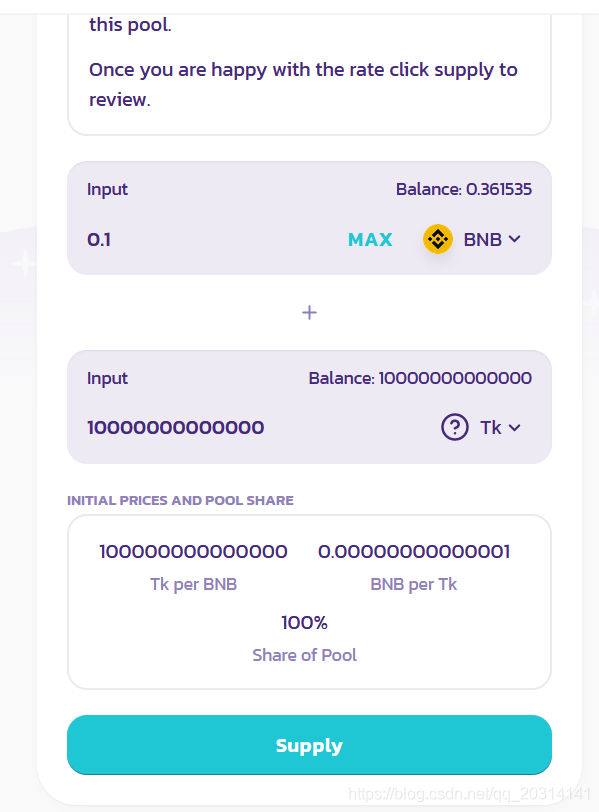
最后就能测试交易了
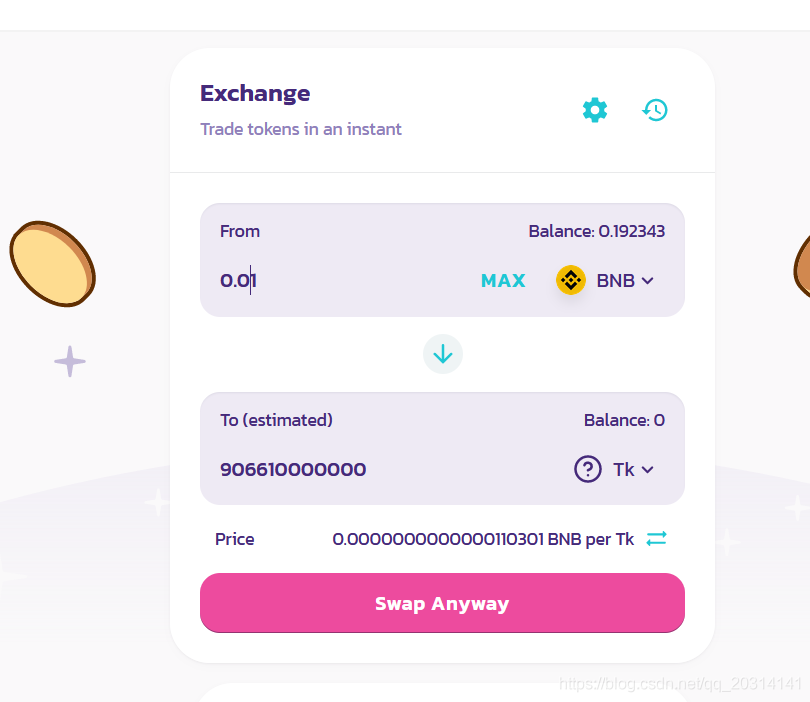
ERC20.sol代码,ERC20.sol实现了IERC20接口的一系列方法,有铸币,交易,转账等基础方法。
// SPDX-License-Identifier: Unlicensed
pragma solidity ^0.6.2;
import "./IERC20.sol";
import "./SafeMath.sol";
contract ERC20 is IERC20 {
using SafeMath for uint256;
mapping (address => uint256) internal _balances;
mapping (address => mapping (address => uint256)) internal _allowances;
uint256 private _totalSupply;
/**
* @dev See `IERC20.totalSupply`.
*/
function totalSupply() public override view returns (uint256) {
return _totalSupply;
}
/**
* @dev See `IERC20.balanceOf`.
*/
function balanceOf(address account) public override view returns (uint256) {
return _balances[account];
}
/**
* @dev See `IERC20.transfer`.
*
* Requirements:
*
* - `recipient` cannot be the zero address.
* - the caller must have a balance of at least `amount`.
*/
function transfer(address recipient, uint256 amount) public override returns (bool) {
_transfer(msg.sender, recipient, amount);
return true;
}
/**
* @dev See `IERC20.allowance`.
*/
function allowance(address owner, address spender) public override view returns (uint256) {
return _allowances[owner][spender];
}
/**
* @dev See `IERC20.approve`.
*
* Requirements:
*
* - `spender` cannot be the zero address.
*/
function approve(address spender, uint256 value) public override returns (bool) {
_approve(msg.sender, spender, value);
return true;
}
/**
* @dev See `IERC20.transferFrom`.
*
* Emits an `Approval` event indicating the updated allowance. This is not
* required by the EIP. See the note at the beginning of `ERC20`;
*
* Requirements:
* - `sender` and `recipient` cannot be the zero address.
* - `sender` must have a balance of at least `value`.
* - the caller must have allowance for `sender`'s tokens of at least
* `amount`.
*/
function transferFrom(address sender, address recipient, uint256 amount) public override returns (bool) {
_transfer(sender, recipient, amount);
_approve(sender, msg.sender, _allowances[sender][msg.sender].sub(amount));
return true;
}
/**
* @dev Atomically increases the allowance granted to `spender` by the caller.
*
* This is an alternative to `approve` that can be used as a mitigation for
* problems described in `IERC20.approve`.
*
* Emits an `Approval` event indicating the updated allowance.
*
* Requirements:
*
* - `spender` cannot be the zero address.
*/
function increaseAllowance(address spender, uint256 addedValue) public returns (bool) {
_approve(msg.sender, spender, _allowances[msg.sender][spender].add(addedValue));
return true;
}
/**
* @dev Atomically decreases the allowance granted to `spender` by the caller.
*
* This is an alternative to `approve` that can be used as a mitigation for
* problems described in `IERC20.approve`.
*
* Emits an `Approval` event indicating the updated allowance.
*
* Requirements:
*
* - `spender` cannot be the zero address.
* - `spender` must have allowance for the caller of at least
* `subtractedValue`.
*/
function decreaseAllowance(address spender, uint256 subtractedValue) public returns (bool) {
_approve(msg.sender, spender, _allowances[msg.sender][spender].sub(subtractedValue));
return true;
}
/**
* @dev Moves tokens `amount` from `sender` to `recipient`.
*
* This is internal function is equivalent to `transfer`, and can be used to
* e.g. implement automatic token fees, slashing mechanisms, etc.
*
* Emits a `Transfer` event.
*
* Requirements:
*
* - `sender` cannot be the zero address.
* - `recipient` cannot be the zero address.
* - `sender` must have a balance of at least `amount`.
*/
function _transfer(address sender, address recipient, uint256 amount) internal {
require(sender != address(0), "ERC20: transfer from the zero address");
require(recipient != address(0), "ERC20: transfer to the zero address");
_balances[sender] = _balances[sender].sub(amount);
_balances[recipient] = _balances[recipient].add(amount);
emit Transfer(sender, recipient, amount);
}
/** @dev Creates `amount` tokens and assigns them to `account`, increasing
* the total supply.
*
* Emits a `Transfer` event with `from` set to the zero address.
*
* Requirements
*
* - `to` cannot be the zero address.
*/
function _mint(address account, uint256 amount) internal {
require(account != address(0), "ERC20: mint to the zero address");
_totalSupply = _totalSupply.add(amount);
_balances[account] = _balances[account].add(amount);
emit Transfer(address(0), account, amount);
}
/**
* @dev Destoys `amount` tokens from `account`, reducing the
* total supply.
*
* Emits a `Transfer` event with `to` set to the zero address.
*
* Requirements
*
* - `account` cannot be the zero address.
* - `account` must have at least `amount` tokens.
*/
function _burn(address account, uint256 value) internal {
require(account != address(0), "ERC20: burn from the zero address");
_totalSupply = _totalSupply.sub(value);
_balances[account] = _balances[account].sub(value);
emit Transfer(account, address(0), value);
}
/**
* @dev Sets `amount` as the allowance of `spender` over the `owner`s tokens.
*
* This is internal function is equivalent to `approve`, and can be used to
* e.g. set automatic allowances for certain subsystems, etc.
*
* Emits an `Approval` event.
*
* Requirements:
*
* - `owner` cannot be the zero address.
* - `spender` cannot be the zero address.
*/
function _approve(address owner, address spender, uint256 value) internal {
require(owner != address(0), "ERC20: approve from the zero address");
require(spender != address(0), "ERC20: approve to the zero address");
_allowances[owner][spender] = value;
emit Approval(owner, spender, value);
}
/**
* @dev Destoys `amount` tokens from `account`.`amount` is then deducted
* from the caller's allowance.
*
* See `_burn` and `_approve`.
*/
function _burnFrom(address account, uint256 amount) internal {
_burn(account, amount);
_approve(account, msg.sender, _allowances[account][msg.sender].sub(amount));
}
}
IERC20.sol代码
// SPDX-License-Identifier: MIT License
pragma solidity ^0.6.2;
/**
* @dev Interface of the ERC20 standard as defined in the EIP.
*/
interface IERC20 {
/**
* @dev Returns the amount of tokens in existence.
*/
function totalSupply() external view returns (uint256);
/**
* @dev Returns the amount of tokens owned by `account`.
*/
function balanceOf(address account) external view returns (uint256);
/**
* @dev Moves `amount` tokens from the caller's account to `recipient`.
*
* Returns a boolean value indicating whether the operation succeeded.
*
* Emits a {Transfer} event.
*/
function transfer(address recipient, uint256 amount) external returns (bool);
/**
* @dev Returns the remaining number of tokens that `spender` will be
* allowed to spend on behalf of `owner` through {transferFrom}. This is
* zero by default.
*
* This value changes when {approve} or {transferFrom} are called.
*/
function allowance(address owner, address spender) external view returns (uint256);
/**
* @dev Sets `amount` as the allowance of `spender` over the caller's tokens.
*
* Returns a boolean value indicating whether the operation succeeded.
*
* IMPORTANT: Beware that changing an allowance with this method brings the risk
* that someone may use both the old and the new allowance by unfortunate
* transaction ordering. One possible solution to mitigate this race
* condition is to first reduce the spender's allowance to 0 and set the
* desired value afterwards:
* https://github.com/ethereum/EIPs/issues/20#issuecomment-263524729
*
* Emits an {Approval} event.
*/
function approve(address spender, uint256 amount) external returns (bool);
/**
* @dev Moves `amount` tokens from `sender` to `recipient` using the
* allowance mechanism. `amount` is then deducted from the caller's
* allowance.
*
* Returns a boolean value indicating whether the operation succeeded.
*
* Emits a {Transfer} event.
*/
function transferFrom(
address sender,
address recipient,
uint256 amount
) external returns (bool);
/**
* @dev Emitted when `value` tokens are moved from one account (`from`) to
* another (`to`).
*
* Note that `value` may be zero.
*/
event Transfer(address indexed from, address indexed to, uint256 value);
/**
* @dev Emitted when the allowance of a `spender` for an `owner` is set by
* a call to {approve}. `value` is the new allowance.
*/
event Approval(address indexed owner, address indexed spender, uint256 value);
}





